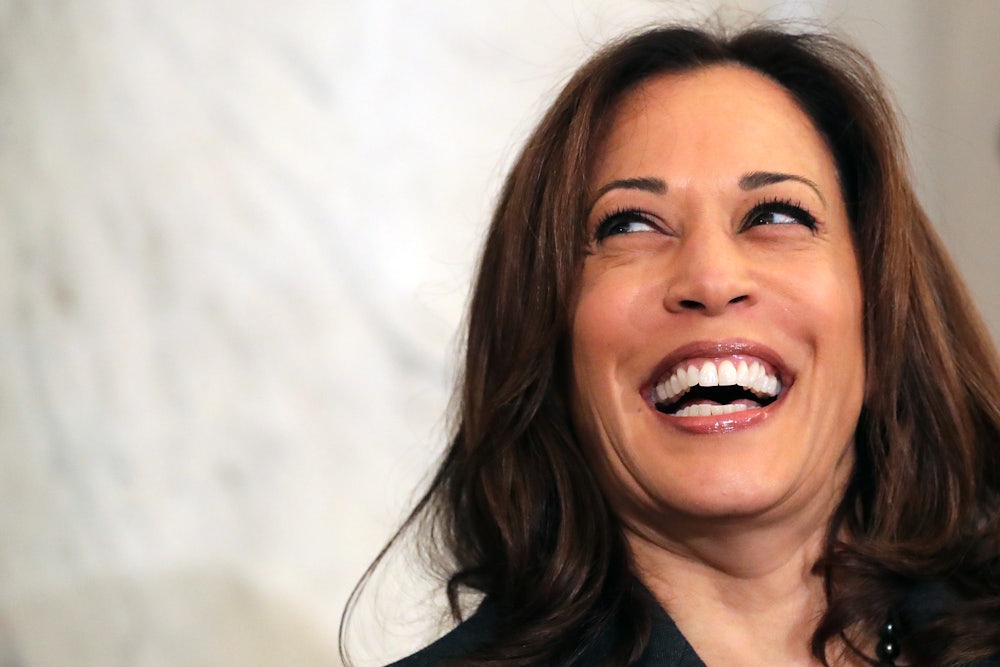How do you break out of a funk? A change of scenery always helps. That, at least, will be Kamala Harris’s approach. After her notable performance in the June debate for Democratic presidential hopefuls, California’s junior senator is suffering through what an internal campaign memo (accidentally left behind in a New Hampshire restaurant) referred to as a “summer slump.” Now, as she told her coworker, Senator Mazie Hirono, she’s “moving to fucking Iowa.”
It’s a common tactic for candidates with sputtering campaigns—though Harris won’t go as far as then-Connecticut Senator Chris Dodd, who moved his family to Iowa in 2007. (He dropped out of the 2008 contest after finishing sixth in the state.) It’s also a rather public repudiation of her early, big fundraiser-heavy approach to the Democratic primary, and an acknowledgment that she mismanaged the bump she got after attacking Joe Biden’s record on busing and integration.
In the weeks after Harris’s blistering takedown of the former vice president, the primary briefly looked like a four-person race. Although Harris is still polling fourth, she is in the single digits, significantly behind Biden and Senators Elizabeth Warren and Bernie Sanders. And despite that heavy emphasis on fundraising in the early months of the campaign, she has also struggled to bring in the money she needs to boost name recognition. As Politico reported earlier this week, “Harris’ so-called ‘hybrid’ strategy—an attempt to strike a balance high-dollar events with small-dollar online fundraising—was complicated by her sluggish summer. Online giving typically slows when a campaign hits a rough patch. That’s made Harris even more reliant on the in-person events that require travel and considerable time away from the trail.”
Harris had tried a “hybrid” strategy of sorts on the trail, too. From the start, her goal was sensible: She would cast herself as a unity candidate, someone that members of the party’s progressive and moderate wings could get behind. But given the distance between the campaign approaches and political policies of all three, this was no easy feat. She has repeatedly made squishy statements of support for aspects of the bold domestic agendas advocated by Sanders and Warren. She has gone after Biden, the candidate who is leading among African Americans, but also a candidate with less-committed supporters than Warren or Sanders. Finally, she has based her campaign around Obama-esque appeals to unity and a larger, shared purpose.
After the first Democratic debate, the strategy seemed to be working. Harris surged in the polls. It seemed, for a short while, that she could eat into Biden’s support. But she quickly undercut her own success. Not long after hammering Biden for his opposition to federally mandated busing, Harris acknowledged that she would not push for mandatory busing programs to desegregate schools today. At the same debate, she appeared to back eliminating private insurance, a key element of Sanders and Warren’s health care bill—only to then backtrack immediately after. (Harris has had difficulty explaining her position on Medicare for All throughout the primary, though she did release her own plan in late-July.) These flip-flops only underscored Harris’s apparent lack of a core set of beliefs. Her decision to continue spending significant time raising money probably also undercut her campaign—with Harris behind closed doors instead of building on her post-debate momentum in person with voters.
But Harris was also undercut by her political approach. Her performances in the second and third debates, like her larger “We the People” message, have stressed rising above differences and coming together for a common goal. In the most recent Democratic debate, she asserted, as she often does, that the country needs a proven prosecutor to make the case against the president, saying “He reminds me of that guy in The Wizard of Oz when you pull back the curtain, it’s a really small dude.” (“That guy in The Wizard of Oz” is, in fact, the Wizard of Oz.) She declined to go on the offensive against her rivals, however, including Biden.
That has led to an absence of a consistent campaign theme, beyond the need to come together to defeat a dangerous president. Other candidates, like Sanders and Warren, have stressed a larger message of profound change. To an extent, it’s a classic “show, don’t tell” problem. Harris tells voters we need to heal America, while Warren and Sanders explain how they will do it. Unity is the result of making a persuasive case to voters about how you would alter their lives; Harris too often treats it as a goal we can reach by willing it into existence. There is a palpable sense that she believes taking a stand would damage her case as a uniter. (The recent rise of Elizabeth Warren, in particular, seems to disprove this.)
“I come at issues,” Harris told The New York Times in July, “through the lens of how it actually impacts people, as opposed to, does this issue fit in a certain category of perspective.” That’s a quintessential politician’s answer: Harris is identifying as a pragmatist, someone who will make the best decision, regardless of ideology. But Harris has not articulated what she thinks the best way to make a positive impact on people’s lives actually is. Instead, she’s seemed, well, political when discussing politics, fearful of being boxed in on either the left or the center. That reluctance has created a frequently substance-free campaign, with Harris making a play as a sensible alternative to the three leading contenders without ever quite articulating what that alternative is. Harris may simply be too wedded to establishment politics to adequately critique them.
She is, nevertheless, a skilled politician and it’s possible that a retail-heavy approach will lead to another bounce. But betting big on Iowa is a big risk—just ask President Chris Dodd.
